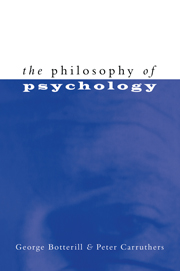Book contents
- Frontmatter
- Contents
- Preface
- Acknowledgements
- 1 Introduction: some background
- 2 Folk-psychological commitments
- 3 Modularity and nativism
- 4 Mind-reading
- 5 Reasoning and irrationality
- 6 Content for psychology
- 7 Content naturalised
- 8 Forms of representation
- 9 Consciousness: the final frontier?
- References
- Index of names
- Index of subjects
2 - Folk-psychological commitments
Published online by Cambridge University Press: 05 June 2012
- Frontmatter
- Contents
- Preface
- Acknowledgements
- 1 Introduction: some background
- 2 Folk-psychological commitments
- 3 Modularity and nativism
- 4 Mind-reading
- 5 Reasoning and irrationality
- 6 Content for psychology
- 7 Content naturalised
- 8 Forms of representation
- 9 Consciousness: the final frontier?
- References
- Index of names
- Index of subjects
Summary
How are folk psychology and scientific psychology related? Are they complementary, or in competition? To what extent do they operate at the same explanatory level? Should scientific psychology assume the basic ontology and some, at least, of the categories recognised by folk psychology? Or should we say that in psychology, as elsewhere, science has little to learn from common sense, and so there is no reason why ‘a serious empirical psychologist should care what the ordinary concept of belief is any more than a serious physicist should care what the ordinary concept of force is’ (Cummins, 1991)? The present chapter begins to address these questions.
Realisms and anti-realisms
Before we can determine what, if anything, scientific psychology should take from the folk, we must have some idea of what there is to take. This is a matter of considerable dispute in the philosophy of mind. Specifically, it is a dispute between realists about folk psychology and their opponents. The realists (of intention – see below) think that there is more to take, because they believe that in explaining and predicting people's actions and reactions on the basis of their intentional states (beliefs, desires, hopes, fears, and the like) we are committed both to there being such things as intentional states (as types or kinds – we return to this point later) and to these states having a causal effect. Opponents of this sort of folk-psychological realism come in various forms, but are all at least united in rejecting the claim that folk psychology commits us to the existence of causally efficacious intentional state-types.
- Type
- Chapter
- Information
- The Philosophy of Psychology , pp. 24 - 48Publisher: Cambridge University PressPrint publication year: 1999



